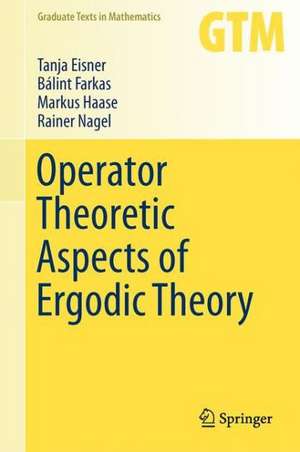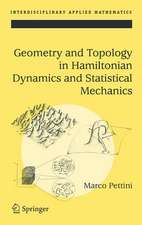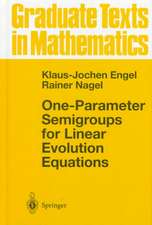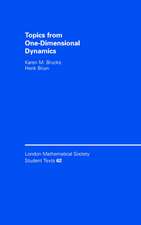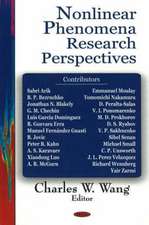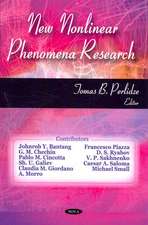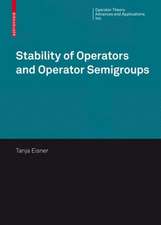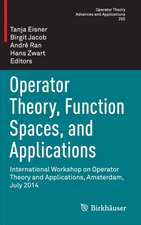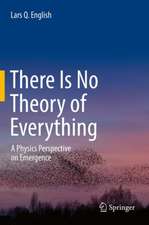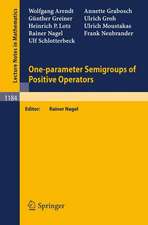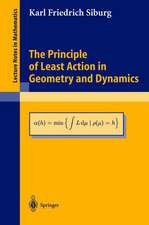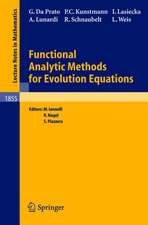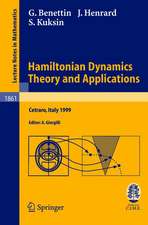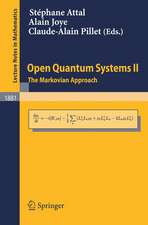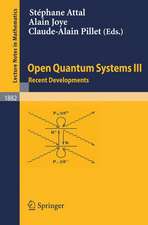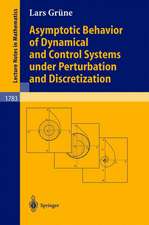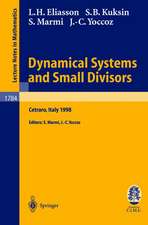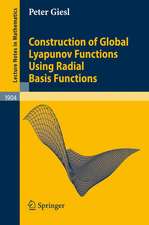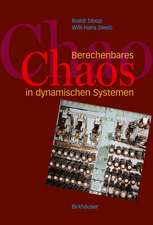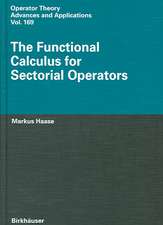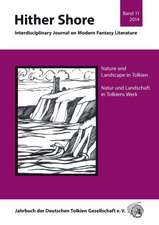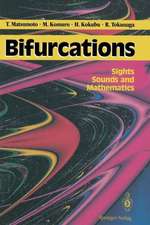Operator Theoretic Aspects of Ergodic Theory: Graduate Texts in Mathematics, cartea 272
Autor Tanja Eisner, Bálint Farkas, Markus Haase, Rainer Nagelen Limba Engleză Hardback – 28 noi 2015
Stunning recent results by Host–Kra, Green–Tao, and others, highlight the timeliness of this systematic introduction to classical ergodic theory using the tools of operator theory. Assuming no prior exposure to ergodic theory, this book provides a modern foundation for introductory courses on ergodic theory, especially for students or researchers with an interest in functional analysis. While basic analytic notions and results are reviewed in several appendices, more advanced operator theoretic topics are developed in detail, even beyond their immediate connection with ergodic theory. As a consequence, the book is also suitable for advanced or special-topic courses on functional analysis with applications to ergodic theory.
Topics include:
• an intuitive introduction to ergodic theory
• an introduction to the basic notions, constructions, and standard examples of topological dynamical systems
• Koopman operators, Banach lattices, lattice and algebra homomorphisms, and the Gelfand–Naimark theorem
• measure-preserving dynamical systems
• von Neumann’s Mean Ergodic Theorem and Birkhoff’s Pointwise Ergodic Theorem
• strongly and weakly mixing systems
• an examination of notions of isomorphism for measure-preserving systems
• Markov operators, and the related concept of a factor of a measure preserving system
• compact groups and semigroups, and a powerful tool in their study, the Jacobs–de Leeuw–Glicksberg decomposition
• an introduction to the spectral theory of dynamical systems, the theorems of Furstenberg and Weiss on multiple recurrence, and applications of dynamical systems to combinatorics (theorems of van der Waerden, Gallai,and Hindman, Furstenberg’s Correspondence Principle, theorems of Roth and Furstenberg–Sárközy)
Beyond its use in the classroom, Operator Theoretic Aspects of Ergodic Theory can serve as a valuable foundation for doing research at the intersection of ergodic theory and operator theory
| Toate formatele și edițiile | Preț | Express |
|---|---|---|
| Paperback (1) | 559.79 lei 6-8 săpt. | |
| Springer International Publishing – 23 aug 2016 | 559.79 lei 6-8 săpt. | |
| Hardback (1) | 551.21 lei 6-8 săpt. | |
| Springer International Publishing – 28 noi 2015 | 551.21 lei 6-8 săpt. |
Din seria Graduate Texts in Mathematics
-
 Preț: 402.89 lei
Preț: 402.89 lei - 17%
 Preț: 528.68 lei
Preț: 528.68 lei -
 Preț: 337.46 lei
Preț: 337.46 lei -
 Preț: 383.86 lei
Preț: 383.86 lei - 17%
 Preț: 366.57 lei
Preț: 366.57 lei - 17%
 Preț: 398.97 lei
Preț: 398.97 lei -
 Preț: 355.83 lei
Preț: 355.83 lei -
 Preț: 411.84 lei
Preț: 411.84 lei -
 Preț: 404.48 lei
Preț: 404.48 lei -
 Preț: 289.88 lei
Preț: 289.88 lei - 17%
 Preț: 365.80 lei
Preț: 365.80 lei - 17%
 Preț: 359.45 lei
Preț: 359.45 lei - 15%
 Preț: 488.70 lei
Preț: 488.70 lei - 13%
 Preț: 357.76 lei
Preț: 357.76 lei -
 Preț: 407.88 lei
Preț: 407.88 lei - 13%
 Preț: 352.49 lei
Preț: 352.49 lei - 13%
 Preț: 358.86 lei
Preț: 358.86 lei - 13%
 Preț: 393.48 lei
Preț: 393.48 lei - 11%
 Preț: 351.00 lei
Preț: 351.00 lei - 17%
 Preț: 359.58 lei
Preț: 359.58 lei -
 Preț: 350.46 lei
Preț: 350.46 lei - 8%
 Preț: 567.37 lei
Preț: 567.37 lei -
 Preț: 399.74 lei
Preț: 399.74 lei -
 Preț: 498.91 lei
Preț: 498.91 lei - 20%
 Preț: 571.26 lei
Preț: 571.26 lei - 15%
 Preț: 546.59 lei
Preț: 546.59 lei -
 Preț: 498.69 lei
Preț: 498.69 lei - 15%
 Preț: 354.39 lei
Preț: 354.39 lei -
 Preț: 313.11 lei
Preț: 313.11 lei - 13%
 Preț: 427.40 lei
Preț: 427.40 lei - 17%
 Preț: 363.60 lei
Preț: 363.60 lei -
 Preț: 340.19 lei
Preț: 340.19 lei - 17%
 Preț: 364.47 lei
Preț: 364.47 lei - 17%
 Preț: 366.47 lei
Preț: 366.47 lei - 17%
 Preț: 366.07 lei
Preț: 366.07 lei -
 Preț: 247.59 lei
Preț: 247.59 lei - 17%
 Preț: 367.70 lei
Preț: 367.70 lei - 13%
 Preț: 356.80 lei
Preț: 356.80 lei - 17%
 Preț: 398.78 lei
Preț: 398.78 lei - 17%
 Preț: 398.51 lei
Preț: 398.51 lei - 17%
 Preț: 496.65 lei
Preț: 496.65 lei - 13%
 Preț: 361.80 lei
Preț: 361.80 lei - 15%
 Preț: 482.97 lei
Preț: 482.97 lei -
 Preț: 402.02 lei
Preț: 402.02 lei - 17%
 Preț: 366.57 lei
Preț: 366.57 lei - 20%
 Preț: 449.74 lei
Preț: 449.74 lei -
 Preț: 380.35 lei
Preț: 380.35 lei
Preț: 551.21 lei
Preț vechi: 648.48 lei
-15% Nou
Puncte Express: 827
Preț estimativ în valută:
105.49€ • 109.72$ • 87.09£
105.49€ • 109.72$ • 87.09£
Carte tipărită la comandă
Livrare economică 14-28 aprilie
Preluare comenzi: 021 569.72.76
Specificații
ISBN-13: 9783319168975
ISBN-10: 3319168975
Pagini: 584
Ilustrații: XVIII, 628 p.
Dimensiuni: 155 x 235 x 32 mm
Greutate: 1.08 kg
Ediția:1st ed. 2015
Editura: Springer International Publishing
Colecția Springer
Seria Graduate Texts in Mathematics
Locul publicării:Cham, Switzerland
ISBN-10: 3319168975
Pagini: 584
Ilustrații: XVIII, 628 p.
Dimensiuni: 155 x 235 x 32 mm
Greutate: 1.08 kg
Ediția:1st ed. 2015
Editura: Springer International Publishing
Colecția Springer
Seria Graduate Texts in Mathematics
Locul publicării:Cham, Switzerland
Public țintă
GraduateCuprins
What is Ergodic Theory?.- Topological Dynamical Systems.- Minimality and Recurrence.- The C*-algebra C(K) and the Koopman Operator.- Measure-Preserving Systems.- Recurrence and Ergodicity.- The Banach Lattice Lp and the Koopman Operator.- The Mean Ergodic Theorem.- Mixing Dynamical Systems.- Mean Ergodic Operators on C(K).- The Pointwise Ergodic Theorem.- Isomorphisms and Topological Models.- Markov Operators.- Compact Semigroups and Groups.- Topological Dynamics Revisited.- The Jacobs–de Leeuw–Glicksberg Decomposition.- Dynamical Systems with Discrete Spectrum.- A Glimpse at Arithmetic Progressions.- Joinings.- The Host–Kra–Tao Theorem.- More Ergodic Theorems.- Appendix A: Topology.- Appendix B: Measure and Integration Theory.- Appendix C: Functional Analysis.- Appendix D: The Riesz Representation Theorem.- Appendix E: Theorems of Eberlein, Grothendieck, and Ellis.
Recenzii
“This book can serve as a good introduction to an active research area. Each chapter ends with a nice list of exercises. At the end of the book complementary material can be found on measure theory, functional analysis, operator theory, the Riesz representation theorem, and more. This makes the book self-contained. The book has the potential to become a basic reference in this field.” (Idris Assani, Mathematical Reviews, January, 2017)
Notă biografică
Tanja Eisner is a Professor of Mathematics at the University of Leipzig. Bálint Farkas is a Professor of Mathematics at the University of Wuppertal. Markus Haase is a Professor of Mathematics at the Delft Institute of Applied Mathematics. Rainer Nagel is a Professor of Mathematics at the University of Tübingen.
Textul de pe ultima copertă
Stunning recent results by Host–Kra, Green–Tao, and others, highlight the timeliness of this systematic introduction to classical ergodic theory using the tools of operator theory. Assuming no prior exposure to ergodic theory, this book provides a modern foundation for introductory courses on ergodic theory, especially for students or researchers with an interest in functional analysis. While basic analytic notions and results are reviewed in several appendices, more advanced operator theoretic topics are developed in detail, even beyond their immediate connection with ergodic theory. As a consequence, the book is also suitable for advanced or special-topic courses on functional analysis with applications to ergodic theory.
Topics include:
•an intuitive introduction to ergodic theory
•an introduction to the basic notions, constructions, and standard examples of topological dynamical systems
•Koopman operators, Banach lattices, lattice and algebra homomorphisms, and the Gelfand–Naimark theorem
•measure-preserving dynamical systems
•von Neumann’s Mean Ergodic Theorem and Birkhoff’s Pointwise Ergodic Theorem
•strongly and weakly mixing systems
•an examination of notions of isomorphism for measure-preserving systems
•Markov operators, and the related concept of a factor of a measure-preserving system
•compact groups and semigroups, and a powerful tool in their study, the Jacobs–de Leeuw–Glicksberg decomposition
•an introduction to the spectral theory of dynamical systems, the theorems of Furstenberg and Weiss on multiple recurrence, and applications of dynamical systems to combinatorics (theorems of van der Waerden, Gallai, and Hindman, Furstenberg’s Correspondence Principle, theorems of Roth and Furstenberg–Sárközy)
Beyond its use in the classroom, Operator Theoretic Aspects of Ergodic Theory can serve as a valuable foundation for doing researchat the intersection of ergodic theory and operator theory
Caracteristici
Treats both classical and recent results in ergodic theory from a modern analytic perspective Assumes no background in ergodic theory, while providing a review of basic results in functional analysis Provides a foundation for understanding recent applications of ergodic theory to combinatorics and number theory
